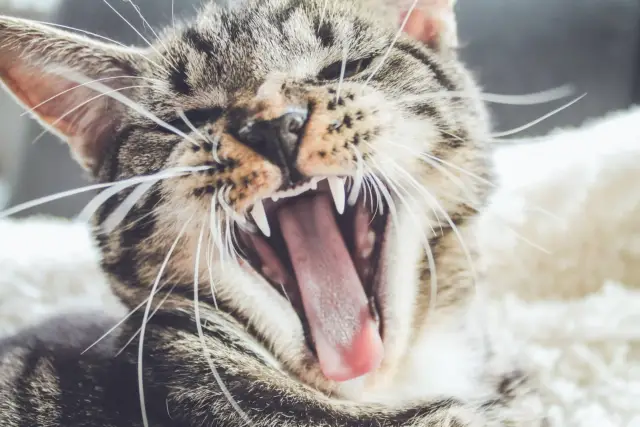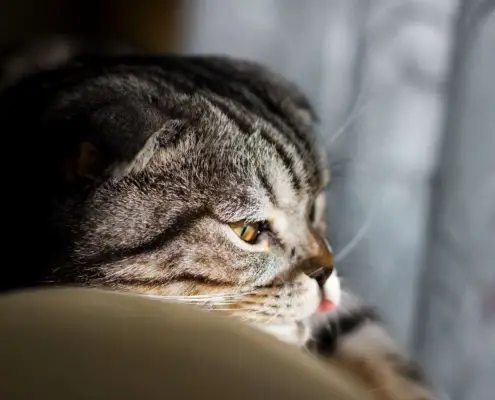
The Tasman Manx cat breed is a captivating and unique feline that has gained popularity among cat lovers worldwide. With its distinct physical features and charming personality, the Tasman Manx has become a sought-after breed. In this article, we will delve into the history and origins of the Tasman Manx cat breed, explore its unique characteristics, examine famous Tasman Manx cats throughout history, discuss the popularity and recognition of the breed, highlight the genetic traits and health considerations, provide guidance on responsible breeding and care, offer tips on finding and adopting a Tasman Manx cat, and answer some frequently asked questions. By the end of this comprehensive guide, you will have a deep understanding and appreciation for the enduring charm of the Tasman Manx cat breed.
History and Origins of the Tasman Manx Cat Breed
The story of the Tasman Manx cat breed begins on the rugged shores of the Isle of Man, a small island nestled in the Irish Sea. Manx cats, known for their taillessness, have a long history on the island and are believed to have been brought to the Isle of Man by Viking settlers. However, the Tasman Manx cat breed, a variant of the Manx breed, originated in Tasmania, an island state of Australia.
The Tasman Manx breed was developed by a group of dedicated breeders in the early 20th century who sought to enhance and preserve the unique characteristics of the Manx cat. These breeders carefully selected Manx cats with desirable traits such as a gentle temperament, robust health, and distinctive appearance. By selectively breeding these cats, they were able to establish a distinct breed known as the Tasman Manx. This breed quickly gained recognition and admiration for its charming personality and striking physical features.
The Unique Characteristics of the Tasman Manx Cat Breed
One of the most distinctive features of the Tasman Manx cat breed is its lack of a tail, a trait inherited from its Manx ancestors. While most cats have tails of varying lengths, Tasman Manx cats are born without a tail or with a short, stubby tail known as a “rumpy.” This unique feature sets them apart from other cat breeds and makes them instantly recognizable.
In addition to their taillessness, Tasman Manx cats have a compact and muscular build. They have a medium-sized body with a broad chest, strong hindquarters, and sturdy legs. Their head is round with a short, broad muzzle, and their ears are medium-sized and slightly rounded at the tips. Their eyes are large, expressive, and come in various colors, ranging from amber to green.
The Tasman Manx breed also boasts a dense double coat that comes in a wide array of colors and patterns. From solid colors such as black, white, and blue to intricate patterns like tortoiseshell, tabby, and calico, there is a Tasman Manx cat to suit every aesthetic preference.
The Popularity and Recognition of the Tasman Manx Cat Breed
Over the years, the Tasman Manx cat breed has gained immense popularity and recognition among cat enthusiasts around the world. Their unique appearance, charming personalities, and playful nature have captured the hearts of many. Tasman Manx cats have been featured in numerous cat shows and competitions, where they have consistently impressed judges with their striking physical features and friendly demeanor.
In recent years, the Tasman Manx breed has also gained recognition from various cat breeding organizations and associations. These organizations have established breed standards for the Tasman Manx cat, outlining the desired physical characteristics and temperament. This recognition has further solidified the breed’s status and increased its appeal among cat lovers and breeders alike.
The Genetic Traits and Health Considerations of the Tasman Manx Cat Breed
The unique genetic traits of the Tasman Manx cat breed are closely tied to its taillessness. The absence of a tail is caused by a genetic mutation that affects the development of the spine and tail during embryonic growth. While the lack of a tail gives the Tasman Manx its distinctive appearance, it can also present health considerations.
Some Tasman Manx cats may experience spinal and neurological issues due to the absence of a tail. This can manifest as balance and coordination problems, as well as potential urinary and fecal incontinence. It is important for owners and breeders to be aware of these potential health issues and to provide appropriate care and support for affected cats.
Regular veterinary check-ups, a balanced diet, and plenty of exercise are essential for maintaining the overall health and well-being of Tasman Manx cats. Additionally, responsible breeders should prioritize genetic testing and selective breeding practices to minimize the risk of hereditary health issues and maintain the breed’s vitality.
Responsible Breeding and Care for Tasman Manx Cats
Responsible breeding is of utmost importance when it comes to preserving the health and integrity of the Tasman Manx cat breed. Breeders should prioritize the welfare of the cats and adhere to ethical breeding practices. This includes conducting genetic tests to identify potential health issues and only breeding cats with favorable genetic profiles. It is crucial to avoid breeding cats that may pass on hereditary health conditions or breed-related deformities.
Proper care for Tasman Manx cats involves providing a stimulating environment, a balanced diet, regular veterinary check-ups, and plenty of love and attention. These cats thrive in homes that offer opportunities for mental and physical stimulation, such as interactive toys, scratching posts, and perches. Regular grooming sessions are also necessary to maintain their luxurious coat and prevent matting.
Finding and Adopting a Tasman Manx Cat
If you are interested in welcoming a Tasman Manx cat into your home, there are several avenues to explore. Local animal shelters and rescue organizations may occasionally have Tasman Manx cats available for adoption. These cats are often in need of loving homes and can make wonderful companions.
Alternatively, you may consider reaching out to reputable breeders who specialize in the Tasman Manx cat breed. It is important to research and choose a breeder who prioritizes the health and well-being of their cats and practices responsible breeding. Ask for references, visit the breeder’s facility, and ensure that the cats are raised in a clean and caring environment.
Frequently Asked Questions About the Tasman Manx Cat Breed
- Are Tasman Manx cats suitable for families with children? Tasman Manx cats are generally known for their friendly and gentle nature, making them great companions for families with children. However, it is important to supervise interactions between young children and cats to ensure the safety and well-being of both.
- Do Tasman Manx cats require special grooming? Tasman Manx cats have a dense double coat that requires regular grooming to prevent matting and keep their fur in optimal condition. Regular brushing sessions and occasional baths are recommended.
- Can Tasman Manx cats live with other pets? Tasman Manx cats can generally get along well with other pets, including dogs and other cats. Proper introductions and gradual acclimation are key to ensuring a harmonious coexistence.
The Enduring Charm of the Tasman Manx Cat Breed
The Tasman Manx cat breed is a fascinating and captivating feline that has a rich history and unique characteristics. From their taillessness to their striking physical features and charming personalities, Tasman Manx cats continue to capture the hearts of cat lovers worldwide. Whether you are considering adopting a Tasman Manx cat or simply have a fascination for this breed, their enduring charm is undeniable. By understanding their history, appreciating their distinct traits, and providing responsible care, you can experience the joy and companionship that Tasman Manx cats bring to our lives.
If you’re interested in welcoming a Tasman Manx cat into your home, take the time to research reputable breeders or consider adopting from local shelters. These amazing felines will bring joy and love into your life, making them a wonderful addition to any family.
If you enjoyed my article, I would appreciate you sharing it with your network.

Sima Ndlebe
Sima writes for CatBuzz. He is interested in Cats, Health and Fitness, and Entrepreneurship.
Published: 13 October 2023



